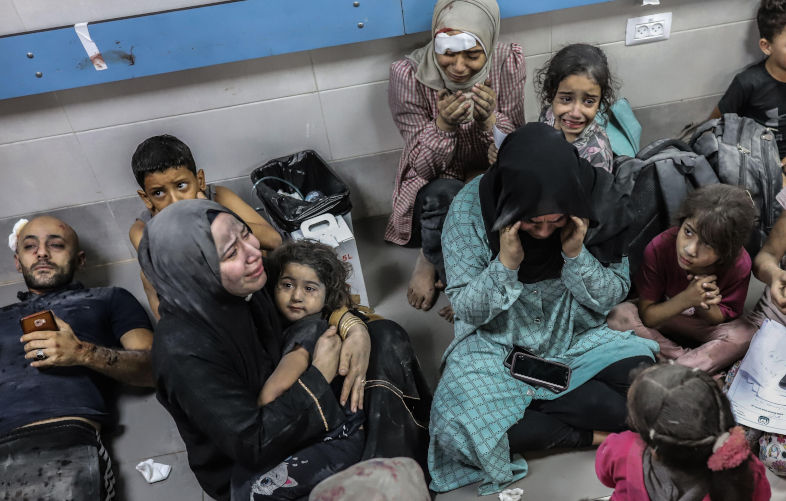Interview that described the hell Gaza has become
September 27, 2025
I am sure I am not the only person who stopped what she was doing early on Tuesday morning to listen the most anguished interview I have ever heard on radio.
Dr Saya Aziz — an Australian anaesthetist working at a hospital in Gaza City – was describing the nightmare she was working in, witnessing, smelling and tasting, as this genocide continues unchecked. Radio National’s Sally Sara held her silence as Dr Aziz described hell.
I couldn’t move. I couldn’t stop crying. I couldn’t stop wondering in the midst of this utter collapse of the international order and our shared humanity, what is to be done?
This is a question we must all grapple with – our own humanity demands nothing less. Nevertheless, we have no guarantees of an answer because we are at the point of the map that reads, beyond here, there be dragons.
Whatever we think about Israel’s bombardment of Gaza, whatever we think about the politics of doing something, or not doing something, we are as witnesses, already in a relationship with the conflict. Further the conflict is so brutal, unrelenting and appalling, we are also in a psychological relationship with it.
The most obvious impact of this relationship is the moral injury it delivers. This is how we describe the damage done to our conscience and moral compass when we perpetrate, or witness or fail to prevent acts and behaviour that transgress our values, ethics and our souls.
Just as being witness to domestic violence can transform the observer, not only the victims, so to is this violence transforming all of us. The question is, in what ways are we changing?
In an individual, moral injury can lead to distress, depression and suicidality. In a nation it can destroy our trust in the national leadership and others in positions of power. It drives a sense of cynicism that is itself corrosive of hope and leaves us with a feeling of very real aloneness as we understand deeply, that if we were ever confronting the horror of Gaza, we too would be abandoned.
But, despite the pervasive sense of powerlessness many in Australia feel right now, there is action we can take to protect the “sacred core” of who we are collectively and individually.
I have spent the last seven years trying to work out how Australia became a country that abuses and, at times, tortures, refugees. The situations are very different, need that be said, but there are lessons we can take from that national experience and what is happening in Gaza.
In the course of my research and book, Australia’s schism in the soul, I interviewed some of Australia’s pre-eminent psychiatrists, all of whom had worked with refugees and asylum seekers over the last decades. In discussing their experience of both the government policy of mandatory detention and its impact on those caught up in this brutal carceral regime, it became clear there was something new to be found in amongst the abuse and the horror.
That is, that political activism — no matter how distressing and visceral — can be a mental health strategy. It is an action that has the power to protect what Donald Winnicott called the sacred core of the person under attack. This is so, in part, because political action has the power to transform what was once experienced as personal into something understood as political.
For instance, in my book, Dr Peter Young suggested that the Australian Government hated hunger strikes in the refugee camps because they had little control over such a personal and political action. Hunger strikes also carry the language and symbolism of political protest. In the face of the deathly shallowness of Australia’s detention regime, this form of political resistance created a vitality and reality that was otherwise absent. This action reasserted a sense of identity: it is I that take this action, it rejected the invitation to sleep and imagine a change was going to come and finally it stayed in contact with reality, even when that reality was brutal. No one looked away.
If we accept that we are, however reluctantly, in a relationship with the violence we are witnessing in Gaza, and if we accept that observing such horror and being unable to prevent it is a source of moral injury to us as people and as a nation, then we are in need of psychological help.
Political action, taken together in whatever form we are able to take it, is the first step in recovery. Moral injury is now understood as injury to the soul and to the soulfulness of the community and nation; it needs to be brought forward into the community for a shared process of healing.
This work begins with all of us.
The views expressed in this article may or may not reflect those of Pearls and Irritations.


